Key takeaways:
- The anti-death penalty debate emphasizes the moral implications and societal values, highlighting the potential for rehabilitation of young offenders from difficult backgrounds.
- Mentorship plays a crucial role in transforming young offenders by providing hope, direction, and fostering personal accountability, enabling them to take ownership of their choices.
- Young offenders face significant challenges, including societal stigma, unstable support systems, and mental health issues that hinder their ability to thrive.
- Effective mentoring techniques involve building trust, goal-setting, and being flexible to address mentees’ immediate needs, fostering personal growth and empowerment.
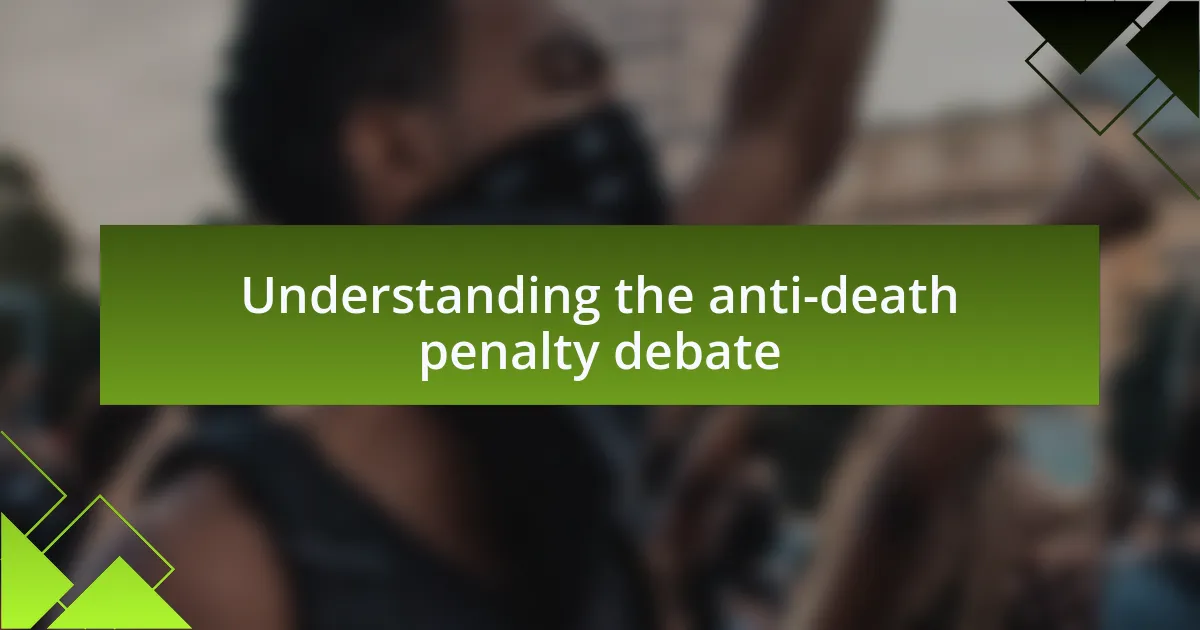
Understanding the anti-death penalty debate
The anti-death penalty debate hinges on the moral implications of taking a life as punishment. I often find myself reflecting on the stories I’ve heard from individuals involved in the justice system. Their experiences reveal a profound truth: no system is infallible, and what does it say about our humanity if we allow irreversible decisions to be made?
Moreover, the issue isn’t just about the convicted; it’s also about societal values. When I worked closely with young offenders, I discovered that many of them were once children trapped in a cycle of poverty, violence, and neglect. Does it make sense to punish those who, by no fault of their own, ended up on a path of crime? This question haunts me and underscores the complexity of the debate.
Additionally, the economic factors cannot be overlooked. I’ve learned that the costs associated with capital punishment can skyrocket due to lengthy legal proceedings and appeals. In my view, wouldn’t those resources be better spent on rehabilitation programs that could potentially transform lives? Exploring these dimensions of the debate provides a clearer picture of why many advocate against the death penalty.
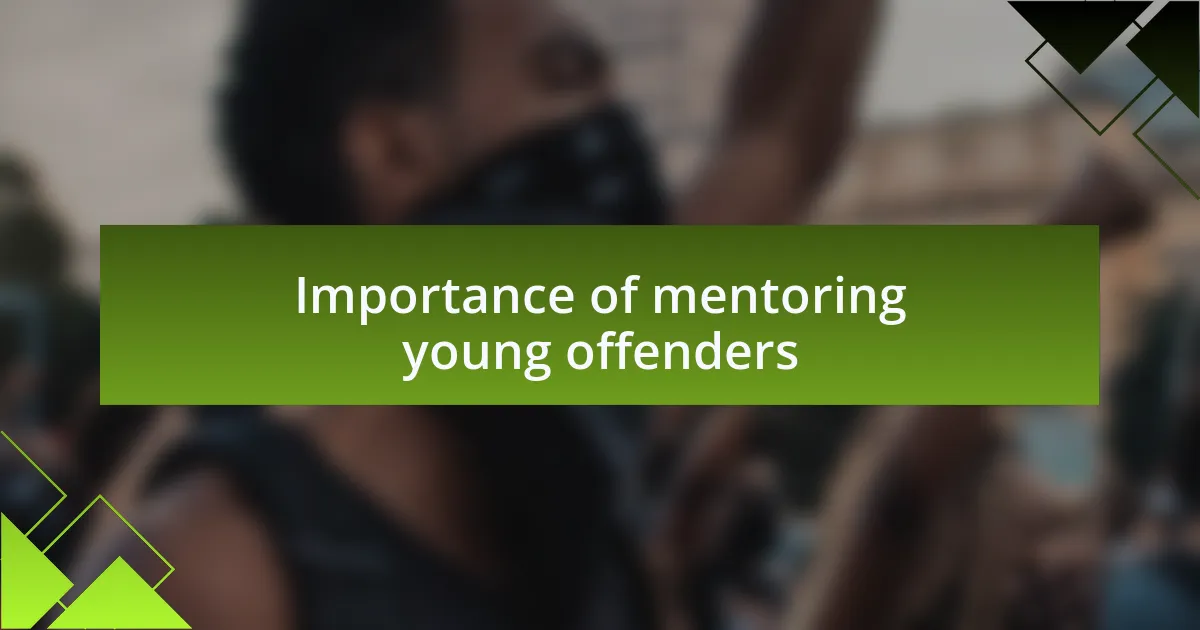
Importance of mentoring young offenders
The importance of mentoring young offenders cannot be overstated. I remember one young man I worked with who was initially closed off and resistant to change. Through consistent support and guidance, he began to open up about his struggles, revealing that he wasn’t just a delinquent; he was a product of his environment, yearning for acceptance and direction. This transformation highlighted for me how crucial mentorship can be in breaking the cycle of crime.
Mentorship provides a unique opportunity for young offenders to find hope and direction. In my experience, a simple conversation can spark a shift in perspective. When I encouraged one young woman to pursue her passion for art, she discovered that self-expression was a powerful tool for healing. By fostering their interests, mentors can help these youths redirect their energy toward positive pursuits, illustrating the potential for change.
Moreover, mentoring paves the way for personal accountability. I’ve seen young individuals evolve from blaming their circumstances to taking ownership of their choices. This shift isn’t just about reducing recidivism; it’s about cultivating a sense of responsibility that can extend beyond the walls of a correctional facility. Isn’t the ultimate goal to empower them to lead fulfilling lives rather than returning to old patterns?
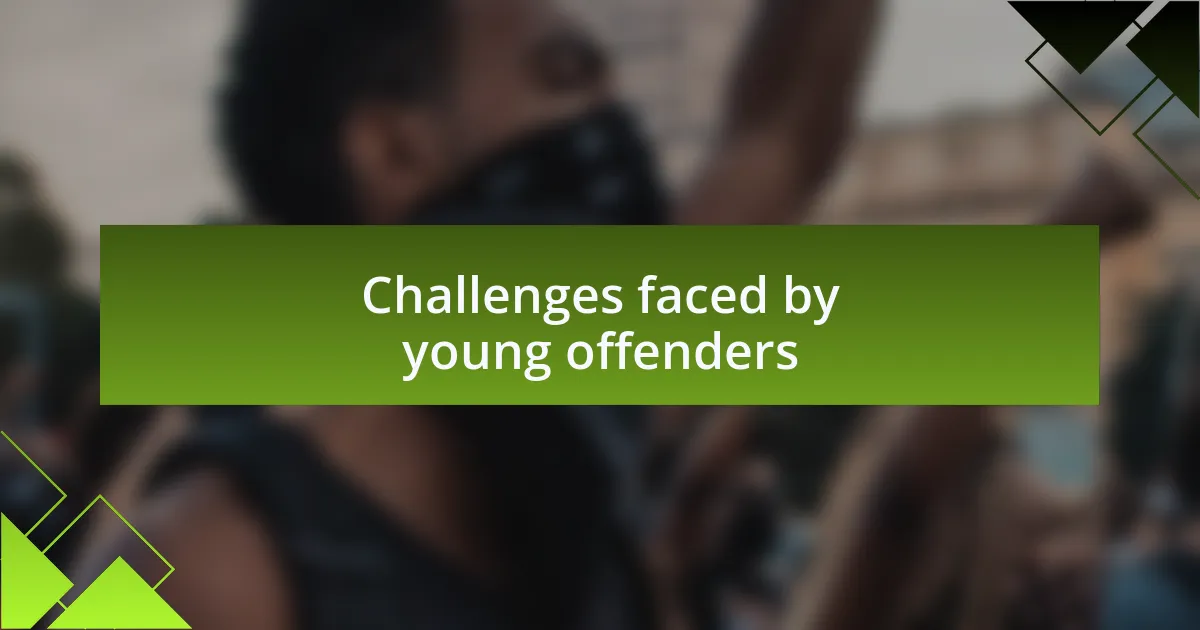
Challenges faced by young offenders
Young offenders encounter a maze of challenges that often feel insurmountable. I recall a young man, eager but burdened, who struggled with societal stigma. It was disheartening to see how labels could overshadow his potential. This stigma not only alienates them from their peers but also limits their access to tools for rehabilitation and support. How can we expect them to thrive when society views them as ‘criminals’ rather than ‘youths in need of guidance’?
Another significant challenge is the lack of stable support systems. I once worked with a young lady whose home life was chaotic; her family struggled with addiction and instability. This environment made it almost impossible for her to focus on any future aspirations. It begs the question: how can we provide young offenders the guidance they need when their foundational support is crumbling? Without consistent mentors or positive role models, the path to transformation can feel lonely and hopeless.
Furthermore, mental health issues are rampant among young offenders, often exacerbated by their experiences. I remember a young individual who frequently dealt with anxiety and low self-worth, stemming from past traumas. These emotional struggles make it difficult for them to engage in constructive conversations about their future. Shouldn’t we prioritize mental health support to break down these barriers? Recognizing and addressing these challenges is essential in guiding them toward a more positive path.
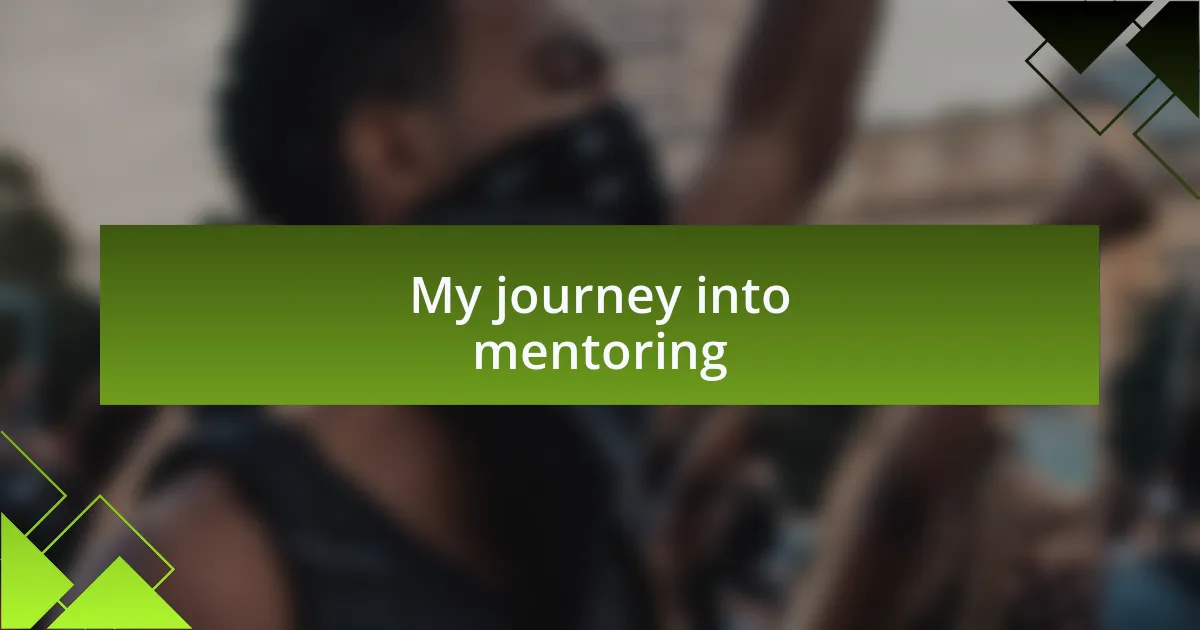
My journey into mentoring
During my journey into mentoring, I found myself stepping into a world that was both sobering and enlightening. One night, I chatted with a young man who felt the weight of his past pressing down on him. As he shared his story, I realized that all he craved was someone who believed in his capacity to change. It struck me how crucial it is for these young individuals to see that their past does not dictate their future.
My experiences have not always been easy. There was a moment when I was running a workshop, and one young lady broke down in tears, overwhelmed by her struggles. I remember feeling a deep sense of urgency to provide her the supportive space she needed. This experience taught me that mentoring isn’t just about sharing knowledge; it’s about being there emotionally and understanding their pain. How can we truly support young offenders if we don’t see them as multifaceted individuals deserving of compassion?
As I navigated this journey, I found that every mentorship session became a two-way street. I learned just as much from my mentees as I hoped to teach them. One young man shared his passion for art, revealing layers of creativity I hadn’t expected. In that moment, I realized that mentorship is not merely guidance; it’s about fostering talent and encouraging exploration. Aren’t we all deserving of someone who champions our dreams?
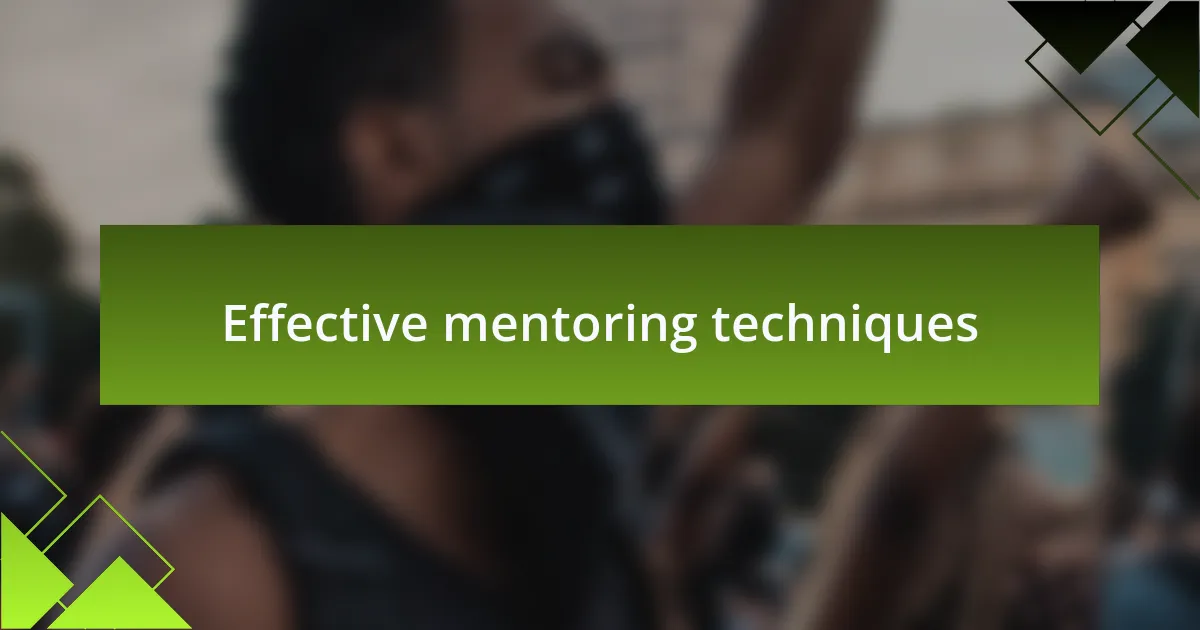
Effective mentoring techniques
Effective mentoring techniques can greatly impact young offenders, and I’ve found that establishing a trusting relationship is paramount. One evening, I spent hours in conversation with a young girl who felt invisible to her peers and the world. By simply listening and validating her feelings, we built a rapport that allowed her to open up about her aspirations and fears, illustrating how trust can pave the way for personal growth.
Another technique I’ve embraced is goal-setting. During one session, I guided a young man through the process of identifying specific, achievable goals. As we broke them down into smaller steps, I could see his confidence build. This method not only gives young offenders direction but also instills a sense of accomplishment as they progress. Isn’t it empowering to watch someone take ownership of their future?
I’ve also learned the importance of flexibility in mentoring. There were days when my agenda went out the window because a mentee needed to work through a personal crisis. In those moments, I realized that the heart of mentoring lies in being adaptable and responsive to their immediate needs. How often do we prioritize structure over connection? Sometimes, being present and available is the most effective technique of all.
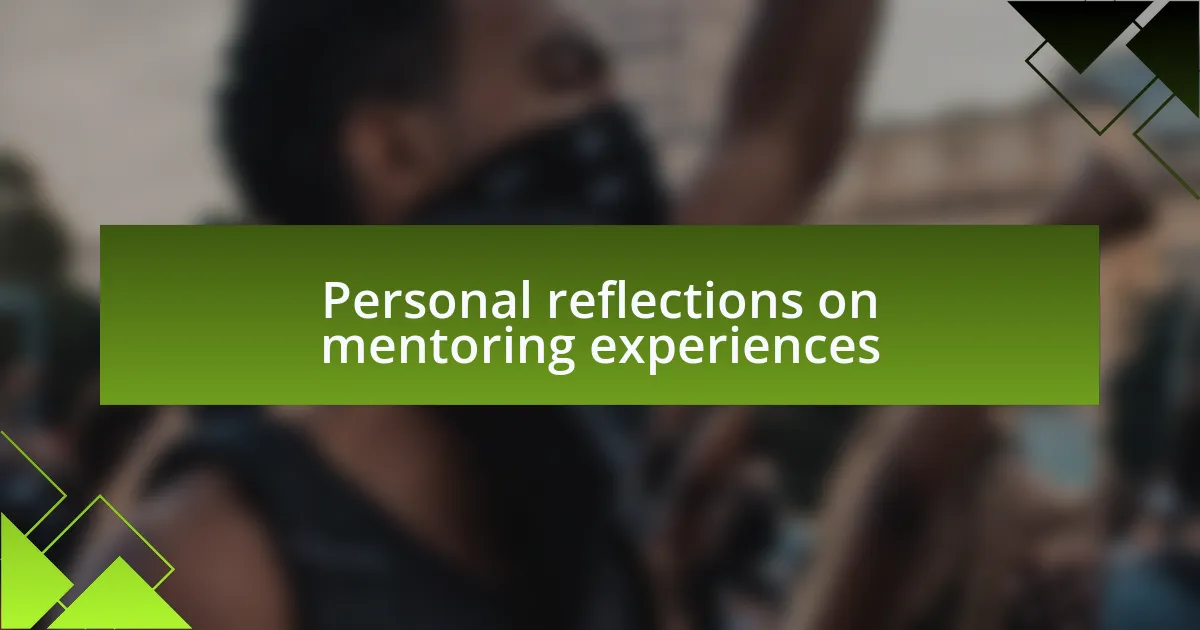
Personal reflections on mentoring experiences
There have been moments during my mentoring journey that have profoundly impacted me. I recall a young man who seemed detached and unmotivated. I remember asking him about his dreams, only to discover that he had a passion for music but felt it was out of reach. Encouraging him to write a song sparked a fire within him, and watching his eyes light up was a reminder of how powerful belief can be. Have you ever witnessed someone rediscover their passion?
In another instance, I encountered a young woman grappling with the shadows of her past decisions. We sat on a park bench, and as she recounted her story, I could feel her vulnerability. I encouraged her to see those experiences not as chains but as stepping stones. Helping her reframe her narrative taught me that sometimes powerful mentoring isn’t about giving advice but about helping them find their own voice amidst the noise of their past. Isn’t it fascinating how shifting perspective can illuminate a path forward?
Reflecting on these experiences, I’ve realized how crucial it is to share my own vulnerabilities alongside their stories. By being open about my struggles, I create a connection that fosters trust and authenticity. One young offender told me how my honesty made him feel less alone in his journey. It’s moments like these that remind me of the human side of mentoring—a relationship built not just on guiding but on shared experiences. Isn’t that what makes life richer and more meaningful?